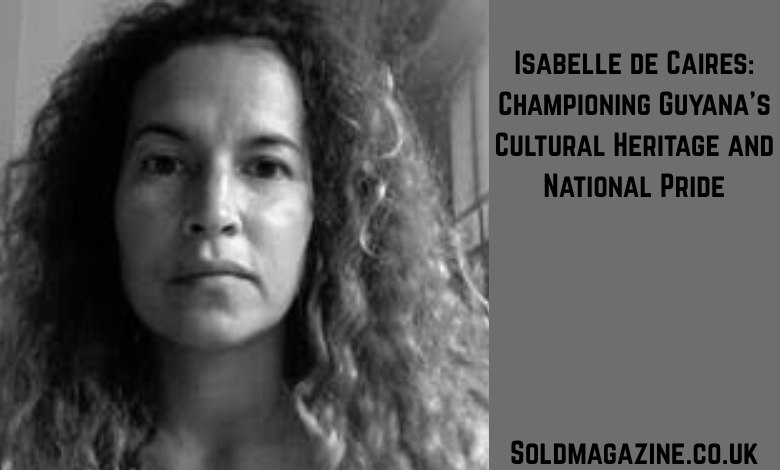Introduction
Isabelle de Caires is recognized in Guyana and the Caribbean region as someone who works at the crossroads of culture, civil society, and heritage. She has been involved with initiatives that bring together arts, history, and public engagement. One of the organizations most closely associated with her work is the Moray House Trust, a private, non-partisan, not-for-profit cultural initiative. The trust exists to foster national pride in Guyana’s heritage, encourage artistic expression, promote conservation and civil liberties, and sustain a vibrant public sphere where ideas are shared openly.
This article takes an in-depth look at Isabelle de Caires, her role within Guyanese society, her connection to cultural and civic work, and the impact of the Moray House Trust.
Early Life and Background
Although not always in the public eye in the same way as political figures or celebrities, Isabelle de Caires belongs to a family name that resonates in Guyana. The de Caires family has longstanding ties to culture, literature, and public life. Her grandfather, for example, was part of a tradition of Caribbean thought and expression. This background influenced her own understanding of the importance of history, freedom of expression, and the need to maintain cultural spaces where Guyanese voices can flourish. Growing up in this environment helped shape her interest in civic engagement and the preservation of Guyana’s cultural and intellectual life.
Connection to the Moray House Trust
The Moray House Trust is central to understanding Isabelle de Caires’ contribution. Established to honor the legacy of her grandfather, Martin Carter—the Guyanese poet often described as one of the Caribbean’s most important literary figures—the trust seeks to keep alive the spirit of cultural inquiry and artistic expression.
The trust is not aligned with political factions, and that independence has been part of its identity. Its activities cover a wide range of fields:
- Organizing public lectures and discussions
- Supporting artistic performances and exhibitions
- Creating opportunities for intellectual exchange
- Promoting conservation efforts tied to Guyana’s environment and built heritage
- Maintaining civil liberties as part of public discourse
Isabelle de Caires has been an active presence in ensuring that the trust remains faithful to its mission of being a hub for ideas and creativity.
Cultural and Civic Role
Through her work, Isabelle de Caires highlights the importance of culture as more than entertainment or ceremony. She points to its role in shaping how societies see themselves and how they interact with their history. By supporting public dialogues at the Moray House Trust, she helps provide a platform where difficult conversations about identity, politics, environment, and social issues can take place. In this sense, her role is less about being a public personality and more about being a facilitator of exchange. That role matters in Guyana, where discussions about development, democracy, and heritage continue to evolve.
Arts and Intellectual Engagement
One of the ways the trust, under her involvement, has made a mark is through its regular events. Writers, artists, musicians, and academics have been hosted to present their work and invite the public to reflect on it. These events are not exclusive; they are intended to open dialogue across Guyanese society. For example, literary readings have introduced younger generations to the works of Guyanese writers, while musical performances have celebrated both traditional and contemporary sounds. Public lectures have ranged from environmental issues like conservation of forests and waterways to questions of governance and civil rights.
By organizing and encouraging these spaces, Isabelle de Caires contributes to sustaining a cultural landscape that resists neglect and provides continuity between generations.
Conservation and Heritage
Another aspect of the Moray House Trust’s mission that resonates with Isabelle de Caires’ work is heritage conservation. Guyana’s history is layered with Indigenous traditions, colonial influences, and post-independence struggles. Preserving both the tangible and intangible elements of this history is crucial. This includes architectural heritage, archives, and oral histories. It also means supporting practices that prevent the loss of cultural memory. De Caires has emphasized the importance of heritage not only as a connection to the past but also as a resource for shaping the future.
Advocacy for Civil Liberties
The trust, and by extension Isabelle de Caires’ work within it, has also been connected to the protection of civil liberties. Guyana’s political history includes periods of tension, censorship, and suppression. Creating independent platforms where citizens can share views openly contributes to protecting freedoms. Through panel discussions, lectures, and forums, the trust provides room for free expression. This aligns with her broader view that a healthy society requires transparency, respect for rights, and dialogue across differences.
Sports and Community
Although less publicized, the Moray House Trust also supports sport as part of its mission. Sport in Guyana, as in much of the Caribbean, is not only about recreation but also community identity. Cricket, in particular, carries cultural weight. Supporting sports alongside arts reflects the holistic view of culture as encompassing all aspects of human activity. De Caires’ role in this aspect connects back to her family, which has ties to cricket administration in the region. This dimension highlights her understanding of culture not as isolated fields but as a network of interconnected practices.
Influence of Martin Carter’s Legacy
A large part of the trust’s vision draws inspiration from Martin Carter’s life and work. Carter’s poetry addressed themes of resistance, freedom, and humanity. His writings were rooted in Guyana’s struggles for independence and justice. By carrying forward his legacy, Isabelle de Caires helps keep his voice alive in contemporary Guyana. The trust, while not limited to Carter’s work, embodies the values he stood for: openness, courage, and a belief in the power of expression.
Challenges in Cultural Work
The work of Isabelle de Caires and the Moray House Trust does not exist without challenges. In Guyana, cultural institutions often struggle with limited funding, lack of infrastructure, and sometimes indifference from broader society. Maintaining non-partisan credibility is also difficult in a politically divided environment. Yet, by remaining committed to its core values, the trust under her involvement continues to navigate these challenges. Another challenge is generational engagement. Ensuring that younger Guyanese connect with cultural and civic spaces is essential. Isabelle de Caires’ role includes creating opportunities for this engagement through inclusive programming and outreach.
The Wider Caribbean Context
Although based in Guyana, Isabelle de Caires’ work connects with broader Caribbean cultural currents. Across the region, similar initiatives exist to preserve heritage, encourage artistic production, and promote dialogue. Guyana’s specific context—geographically South American but culturally Caribbean—adds a unique perspective. The trust’s activities contribute to this regional dialogue by showcasing Guyanese voices and also by inviting cross-Caribbean participation.
Looking Ahead
The future of the Moray House Trust and the role of figures like Isabelle de Caires will depend on sustaining momentum. As Guyana undergoes rapid changes, especially with the rise of its oil economy, cultural and civic spaces will face new pressures and opportunities. De Caires’ work ensures that even amid economic transformation, Guyana does not lose sight of its heritage, its commitment to free expression, and its identity as a diverse society.
Conclusion
Isabelle de Caires represents a voice in Guyana that connects culture, civic responsibility, and heritage preservation. Through her association with the Moray House Trust, she has contributed to creating spaces where Guyanese can reflect, express, and engage. Her story is not about personal publicity but about service to a wider vision: a society where culture and dialogue shape the public sphere. In a country balancing tradition and change, her role illustrates the importance of sustaining institutions that nurture pride, creativity, and freedom.
FAQS
1. Who is Isabelle de Caires?
Isabelle de Caires is a cultural advocate, known for her work with the Moray House Trust and promoting national heritage.
2. What does the Moray House Trust do?
The Moray House Trust focuses on preserving Guyana’s culture, supporting artistic expression, and advocating for civil liberties.
3. How has Isabelle de Caires impacted Guyana?
Isabelle de Caires has contributed significantly to the cultural and social development of Guyana, particularly through her advocacy for the arts.
4. What is Isabelle de Caires’ role in environmental conservation?
Isabelle de Caires advocates for the conservation of Guyana’s natural heritage, emphasizing the balance between development and sustainability.
5. Why is Isabelle de Caires important to Guyana’s arts community?
Isabelle de Caires has played a pivotal role in supporting local artists and promoting Guyanese culture both locally and internationally.




